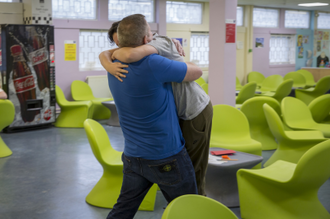Pact research reveals devastating impact of prison on families and children

Image: Pact
Source: Pact
With the prison population now at an all-time high, new research published today demonstrates how prisoners' families are facing their own hidden sentence of financial hardship and emotional strain.
Pact, Prison Advice and Care Trust, is the national Catholic charity supporting people in prison and their children and families. Our new report, 'Serving a Hidden Sentence' documents how families, already on low incomes and affected by rising prices, are being hit by additional costs and are struggling to cover the basics for themselves and their children.
In addition, families describe suffering from a widespread social stigma associated with imprisonment and that their mental and physical health suffer as a result.
Prisoners' families are often hit by a 'double whammy' of costs - the loss of a partner's income, coupled with the extra costs associated with staying in touch with and supporting their loved-one through a sentence.
The Government's research shows that prisoners who stay in touch with family and significant others are 39% less likely to return to crime after prison - so nurturing family relationships where appropriate is hugely important for the common good of our communities. However, 56% of families said money had affected their ability to stay in touch with a loved one in prison.
Key findings from family members:
- 50% of respondents express concerns about affording what they need to care for their children.
- 38% of respondents spend a quarter or more of their household income supporting a loved-one in prison.
- More than half are finding it difficult or very difficult to pay for some of the basics, including being able to afford food (49%), heating (50%) and clothes / shoes (68%).
- 71% are spending two days a week or more of their time to support their loved one.
The harms of imprisonment are not just financial. Many respondents said their health had suffered. The social stigma associated with imprisonment can often result in people seeking to hide or avoid talking about what has happened to their loved-one:
- 83% of respondents said that their mental health was worse or a lot worse; 71% said that their physical health was worse or a lot worse.
- 70% have lost relationships with friends and family.
- Only 29% say that they are always open about their loved-one's time in prison.
On Monday, the Justice Secretary announced a series of welcome measures, including greater use of community sentences and an early release scheme, which should result in a fall in the prison population. However, the prison population is at an all-time high - 88,225 people are in prison - and the prison population has grown by 80% in the last three decades.
Significant progress has been made in recent years to support prisoners to stay in touch with their families. However, in response to the findings, Pact is calling on the Government to:
- Review its Help with Prison Visits scheme which aims to support people on low incomes with the cost of prison visits. One in three respondents were unaware of the scheme.
- Continue to take steps to ensure that prisoners are held as close as possible to families and significant others.
Review prison officer training to ensure that frontline staff understand the importance of keeping people in prison in touch with their families and significant others.
Andy Keen-Downs, CEO of Pact said: "This research lays bare the devastating impact that the imprisonment of a loved-one has on hundreds of thousands of families and children across England & Wales.
"Extra costs and a loss of household income are heaping extra pressure on people already affected by the cost of living crisis. But the impact stretches well beyond financial problems, as family members struggle with the social stigma associated with imprisonment and their physical and mental health deteriorate.
"The Government has this week announced welcome new measures that should lead to a reduction in the prison population. However, right now, the number of people behind bars has never been higher and that means record numbers of families and children suffering the consequences.
"Maintaining family ties plays a crucial role in reducing reoffending. If we are serious about cutting crime and delivering safer communities, we must support prisoners to stay in touch with family. By working together, the prison service and a range of partners have made huge progress in recent years, but this research shows that there is still much that could be done."
Read the full survey:
www.prisonadvice.org.uk/Handlers/Download.ashx?IDMF=76b606e8-7a06-4e0e-bfc6-b096cfd32cc9
FURTHER Pact LINKS
Website: www.prisonadvice.org.uk
Facebook: www.facebook.com/PactFaithAction
Twitter: @PactFaithAction


















